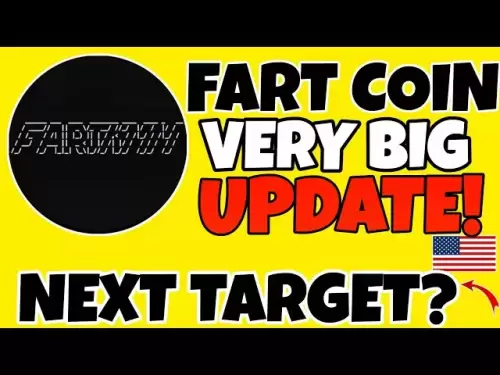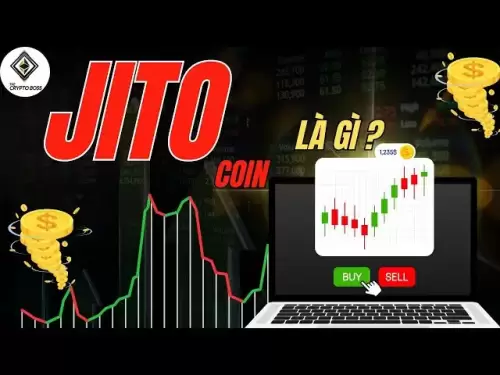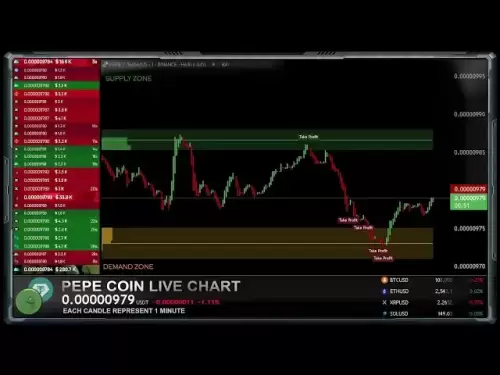-
 Bitcoin
Bitcoin $107,810.8710
-1.45% -
 Ethereum
Ethereum $2,531.4386
-1.75% -
 Tether USDt
Tether USDt $1.0000
-0.03% -
 XRP
XRP $2.2542
-0.99% -
 BNB
BNB $659.1350
-0.50% -
 Solana
Solana $148.5456
-2.40% -
 USDC
USDC $0.9999
-0.02% -
 TRON
TRON $0.2868
-0.44% -
 Dogecoin
Dogecoin $0.1666
-3.65% -
 Cardano
Cardano $0.5751
-2.36% -
 Hyperliquid
Hyperliquid $37.6845
-5.51% -
 Bitcoin Cash
Bitcoin Cash $494.9448
-0.65% -
 Sui
Sui $2.8396
-3.31% -
 Chainlink
Chainlink $13.2423
-2.59% -
 UNUS SED LEO
UNUS SED LEO $9.0482
0.02% -
 Stellar
Stellar $0.2467
-2.44% -
 Avalanche
Avalanche $17.8165
-3.63% -
 Shiba Inu
Shiba Inu $0.0...01158
-2.41% -
 Toncoin
Toncoin $2.7397
-3.42% -
 Hedera
Hedera $0.1560
-2.73% -
 Litecoin
Litecoin $85.8559
-2.34% -
 Monero
Monero $315.3710
-2.30% -
 Dai
Dai $1.0001
0.00% -
 Polkadot
Polkadot $3.3443
-2.03% -
 Ethena USDe
Ethena USDe $1.0001
0.01% -
 Bitget Token
Bitget Token $4.2888
-3.73% -
 Uniswap
Uniswap $7.3388
-1.57% -
 Aave
Aave $278.2986
-3.05% -
 Pepe
Pepe $0.0...09807
-3.67% -
 Pi
Pi $0.4563
-2.39%
How to avoid wasting Gas fees when transferring money through Ethereum wallet?
Minimize Ethereum gas fees by using off-peak transfer times, batch transactions, adjust gas price, utilize Layer-2 solutions like Polygon, and choose a wallet with good gas fee management tools.
Mar 24, 2025 at 02:28 pm
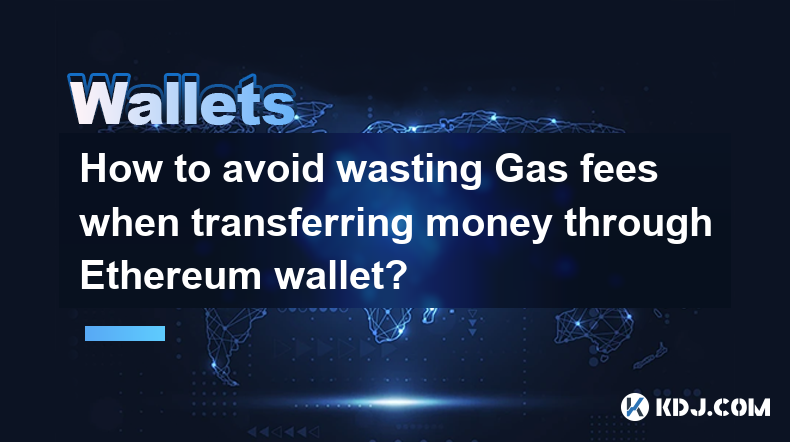
How to Avoid Wasting Gas Fees When Transferring Money Through Ethereum Wallet?
Ethereum's gas fees, the cost of processing transactions on the network, can be unpredictable and sometimes exorbitant. Understanding how these fees work and employing various strategies can significantly reduce your expenses. This article explores several methods to minimize gas consumption and optimize your Ethereum transactions.
Understanding Ethereum Gas Fees
Gas fees aren't a fixed amount; they depend on network congestion and the complexity of your transaction. Higher network activity leads to higher gas prices. A complex transaction, like a smart contract interaction, will consume more gas than a simple token transfer. The price you pay is the gas used multiplied by the current gas price you set.
Choosing the Right Time to Transfer
Network congestion fluctuates throughout the day and week. Off-peak hours often have lower gas prices. Tools and websites track real-time gas prices, allowing you to identify periods with lower costs. Experiment to find the best times for your transactions.
Optimizing Your Transaction
Several factors influence the gas used by your transaction. Sending larger amounts of ETH doesn't necessarily increase gas fees, but more complex transactions, such as interacting with decentralized applications (dApps), invariably do.
Using Batch Transactions
Instead of sending multiple individual transactions, batch them together. This significantly reduces the overall gas cost by combining several actions into a single transaction. Many wallets and tools now support batch transactions.
Adjusting the Gas Price
You have control over the gas price you're willing to pay. Setting a lower gas price will make your transaction slower as miners prioritize higher-paying transactions. However, you'll save money. Experiment with different gas price settings to find a balance between speed and cost.
Utilizing Layer-2 Solutions
Layer-2 scaling solutions, like Polygon or Optimism, operate on top of Ethereum, offering significantly lower transaction fees. These solutions bundle multiple transactions into a single transaction on the main Ethereum chain, reducing gas costs dramatically. You'll need to bridge your assets to the Layer-2 network first.
Selecting the Right Wallet
Different Ethereum wallets offer varying degrees of gas fee optimization. Some wallets provide tools to estimate gas fees more accurately and suggest optimal gas price settings. Research and choose a wallet known for its user-friendly interface and gas fee management features.
Understanding Gas Estimation
Accurate gas estimation is crucial. Your wallet will provide an estimated gas cost, but this is just a prediction. Unexpected complexities can increase the actual gas consumed. It's advisable to have a buffer built into your transaction to avoid unexpected costs.
Using Metamask's Gas Fee Settings
Metamask, a popular Ethereum wallet, offers granular control over gas fees. You can manually adjust the gas price and gas limit. Understanding these settings is crucial for efficient gas fee management.
Exploring Alternative Networks
Consider using alternative blockchains with lower transaction fees. If your goal isn't specifically to interact with Ethereum-based dApps, exploring other networks might be more cost-effective.
Monitoring Gas Fees Regularly
Regularly monitoring gas prices will help you become more adept at timing your transactions. Tools and websites that provide real-time gas price data are invaluable for efficient fee management.
Common Questions and Answers:
Q: What is the average gas fee for an Ethereum transaction?
A: There's no fixed average. Gas fees are highly volatile and depend on network congestion and the complexity of the transaction. They can range from a few cents to several dollars.
Q: Can I get my gas fees refunded if a transaction fails?
A: No, gas fees are consumed regardless of transaction success or failure. The miners still process your transaction, even if it ultimately fails.
Q: How do Layer-2 solutions reduce gas fees?
A: Layer-2 solutions process transactions off the main Ethereum chain, bundling many transactions into a single, cheaper transaction on the main chain.
Q: What happens if I set the gas price too low?
A: Your transaction might take a very long time to be processed or might fail entirely because miners will prioritize transactions with higher gas prices.
Q: Are there any free ways to transfer ETH?
A: No, all transactions on Ethereum require gas fees. However, strategies like using Layer-2 solutions can significantly reduce the cost, making it effectively much cheaper.
Q: How can I predict gas fees more accurately?
A: While perfect prediction is impossible, using real-time gas tracking tools and adjusting your gas price based on network congestion will improve your accuracy.
Q: What's the difference between gas price and gas limit?
A: Gas price is the amount you pay per unit of gas. Gas limit is the maximum amount of gas your transaction is allowed to consume. Setting a gas limit too low can cause your transaction to fail.
Q: Is it better to use a high or low gas limit?
A: A slightly higher gas limit than estimated can account for unforeseen complexities and avoid transaction failure, but setting it excessively high will waste gas.
Q: How do I choose the right gas limit for my transaction?
A: Your wallet usually provides a gas limit estimate. Add a small buffer to account for unexpected increases in gas consumption. If you are unsure, start with a slightly higher estimate.
Disclaimer:info@kdj.com
The information provided is not trading advice. kdj.com does not assume any responsibility for any investments made based on the information provided in this article. Cryptocurrencies are highly volatile and it is highly recommended that you invest with caution after thorough research!
If you believe that the content used on this website infringes your copyright, please contact us immediately (info@kdj.com) and we will delete it promptly.
- KuCoin, AI Incentives, and Gaming RWA: A New Era?
- 2025-07-08 14:30:12
- Meme Token Mania: SPX6900, TOKEN6900, and the Degens Driving Crypto's Brain Rot
- 2025-07-08 14:30:12
- Bitcoin Gains and Strategy Reports: What's the Haps?
- 2025-07-08 15:10:12
- Ripple, XRP ETF, Latest Data: Hopes Fade but Innovation Blooms?
- 2025-07-08 15:10:12
- Bitcoin Gains, Strategy Posts, and Weekly Buys: Decoding the Crypto Craze
- 2025-07-08 15:30:11
- Eric Trump, Bitcoin Asia, and Hong Kong: A Power Trio Shaping Crypto's Future
- 2025-07-08 14:50:12
Related knowledge

How to cancel a pending transaction in Phantom wallet?
Jul 03,2025 at 07:21pm
Understanding Pending Transactions in Phantom WalletA pending transaction in the Phantom wallet occurs when a user initiates a transfer or interaction with the Solana blockchain, but it hasn't yet been confirmed by the network. This can happen due to various reasons such as low transaction fees, network congestion, or incorrect gas settings. It's import...

How to see the estimated value of my tokens in Phantom wallet?
Jul 04,2025 at 12:21am
What is Phantom Wallet?Phantom wallet is one of the most popular cryptocurrency wallets designed for the Solana blockchain. It allows users to store, send, receive, and manage various tokens built on Solana, including SPL tokens and NFTs. The wallet offers a user-friendly interface, making it accessible for both beginners and advanced users in the crypt...

How to lock my Phantom wallet extension?
Jul 03,2025 at 11:14am
What Is the Phantom Wallet and Why Lock It?The Phantom wallet is a popular non-custodial cryptocurrency wallet designed for interacting with the Solana blockchain. Supporting both browser extensions and mobile apps, Phantom allows users to store, send, receive, and stake SOL tokens, as well as interact with decentralized applications (dApps). Securing y...

Does Phantom wallet offer two-factor authentication (2FA)?
Jul 03,2025 at 09:00am
Understanding Phantom Wallet and Its Security FeaturesPhantom wallet is a widely used non-custodial cryptocurrency wallet that supports the Solana blockchain. It allows users to store, send, receive, and interact with decentralized applications (dApps) seamlessly. As security is a top priority for any crypto wallet user, security features like two-facto...
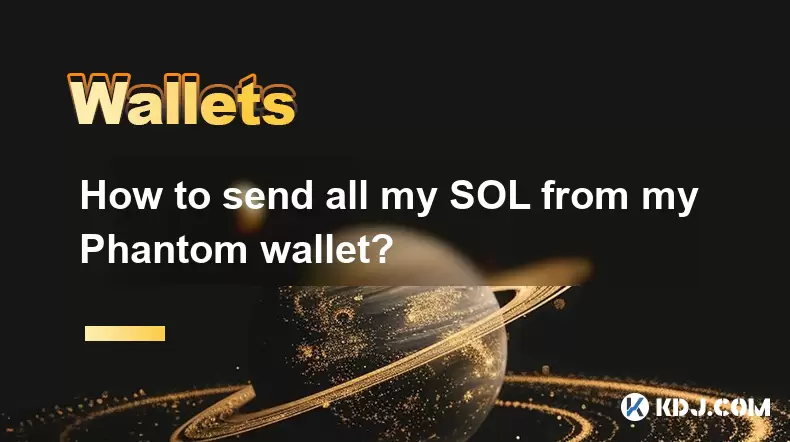
How to send all my SOL from my Phantom wallet?
Jul 06,2025 at 10:00am
Preparing to Send SOL from Your Phantom WalletBefore initiating any transaction, it is crucial to ensure that your Phantom wallet is fully set up and connected to the correct network. Phantom supports multiple networks, but for sending SOL, you must be on the Solana blockchain. Confirm this by checking the network indicator in the top-right corner of th...

What is "rent" on Solana and how does it affect my Phantom wallet?
Jul 02,2025 at 08:35pm
Understanding 'Rent' on SolanaIn the context of Solana, the term 'rent' refers to a storage fee that users pay for maintaining data on the blockchain. Unlike Ethereum, where storage costs are paid once via gas fees during contract deployment, Solana implements a recurring cost model to ensure efficient usage of network resources. This means that any acc...

How to cancel a pending transaction in Phantom wallet?
Jul 03,2025 at 07:21pm
Understanding Pending Transactions in Phantom WalletA pending transaction in the Phantom wallet occurs when a user initiates a transfer or interaction with the Solana blockchain, but it hasn't yet been confirmed by the network. This can happen due to various reasons such as low transaction fees, network congestion, or incorrect gas settings. It's import...

How to see the estimated value of my tokens in Phantom wallet?
Jul 04,2025 at 12:21am
What is Phantom Wallet?Phantom wallet is one of the most popular cryptocurrency wallets designed for the Solana blockchain. It allows users to store, send, receive, and manage various tokens built on Solana, including SPL tokens and NFTs. The wallet offers a user-friendly interface, making it accessible for both beginners and advanced users in the crypt...

How to lock my Phantom wallet extension?
Jul 03,2025 at 11:14am
What Is the Phantom Wallet and Why Lock It?The Phantom wallet is a popular non-custodial cryptocurrency wallet designed for interacting with the Solana blockchain. Supporting both browser extensions and mobile apps, Phantom allows users to store, send, receive, and stake SOL tokens, as well as interact with decentralized applications (dApps). Securing y...

Does Phantom wallet offer two-factor authentication (2FA)?
Jul 03,2025 at 09:00am
Understanding Phantom Wallet and Its Security FeaturesPhantom wallet is a widely used non-custodial cryptocurrency wallet that supports the Solana blockchain. It allows users to store, send, receive, and interact with decentralized applications (dApps) seamlessly. As security is a top priority for any crypto wallet user, security features like two-facto...

How to send all my SOL from my Phantom wallet?
Jul 06,2025 at 10:00am
Preparing to Send SOL from Your Phantom WalletBefore initiating any transaction, it is crucial to ensure that your Phantom wallet is fully set up and connected to the correct network. Phantom supports multiple networks, but for sending SOL, you must be on the Solana blockchain. Confirm this by checking the network indicator in the top-right corner of th...

What is "rent" on Solana and how does it affect my Phantom wallet?
Jul 02,2025 at 08:35pm
Understanding 'Rent' on SolanaIn the context of Solana, the term 'rent' refers to a storage fee that users pay for maintaining data on the blockchain. Unlike Ethereum, where storage costs are paid once via gas fees during contract deployment, Solana implements a recurring cost model to ensure efficient usage of network resources. This means that any acc...
See all articles





















